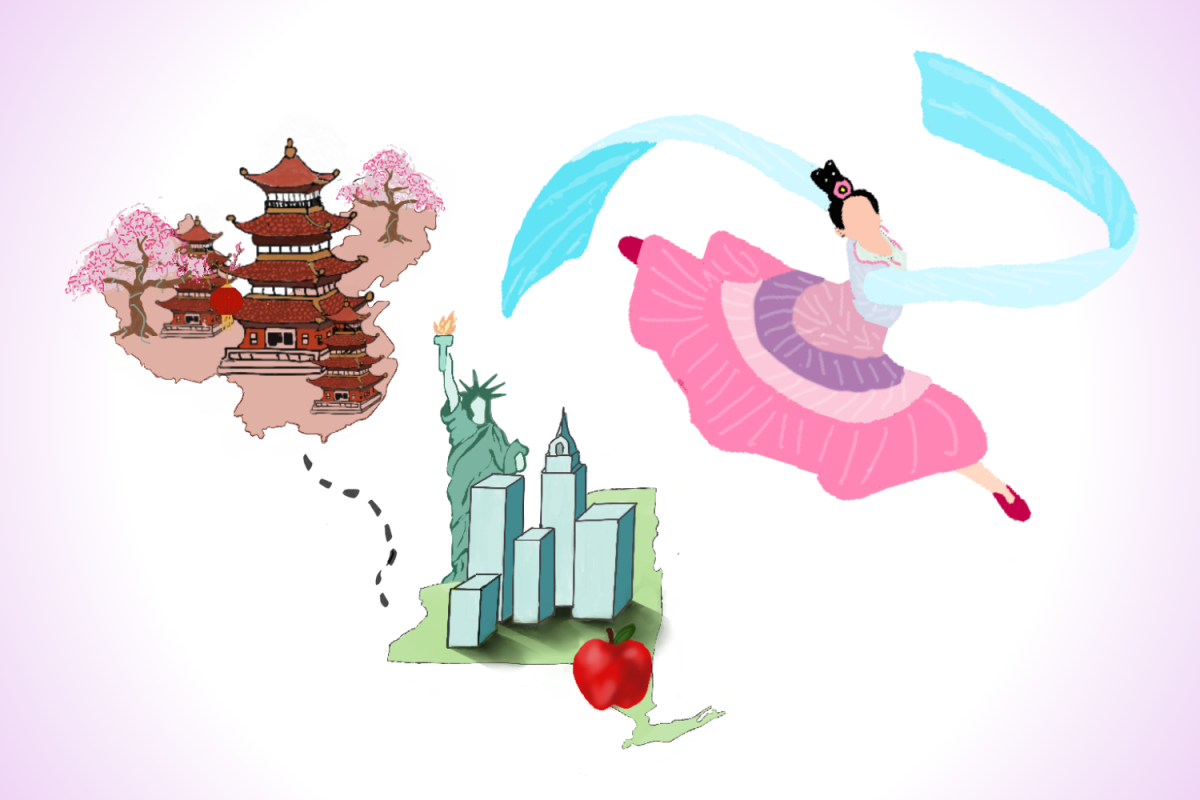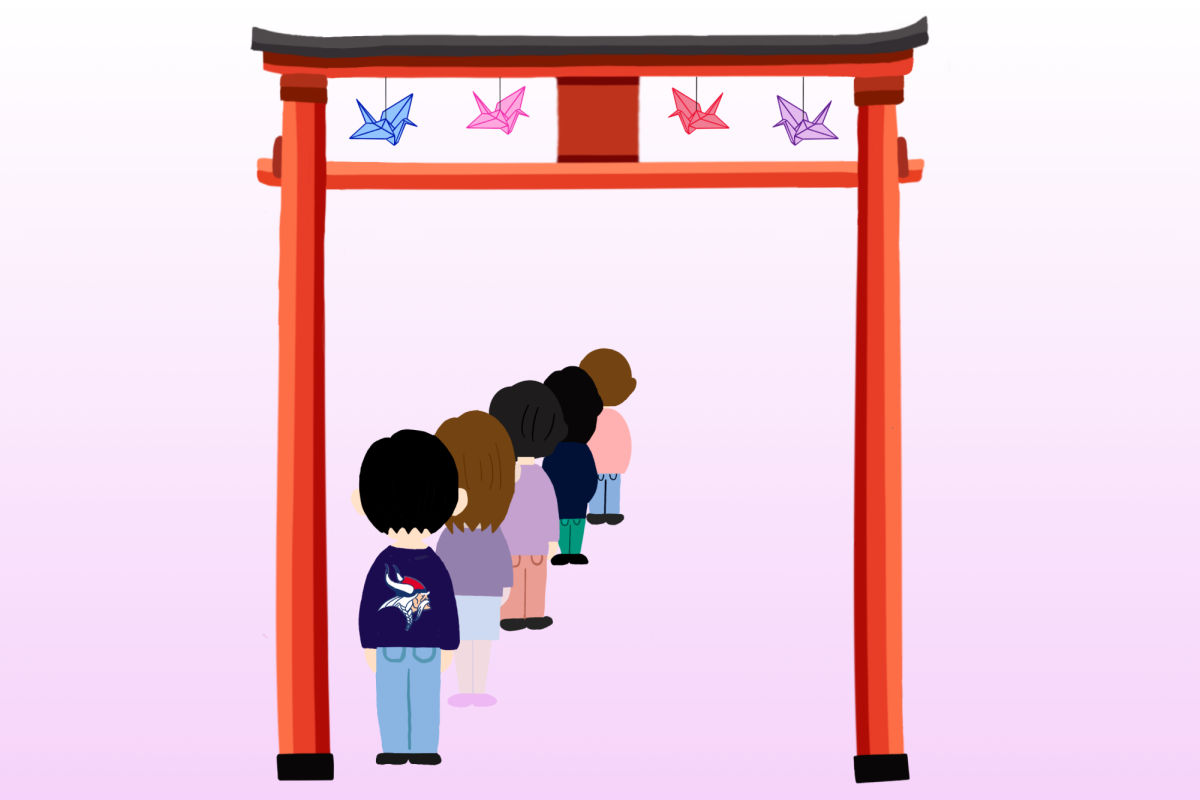A dancer extends her legs across the teal poster, leaping with her head tilted back, sleeves unfurling to her sides to make a bold line for the words “Shen Yun.” Underneath the title, a subheadline stalks boldly across the page: “China before communism.” Whether on billboards driving down local highways or a flyer hung in a shopping plaza, the Bay Area is undoubtedly familiar with these advertisements. Yet, underneath the surface, Shen Yun has been entangled in controversies since its establishment in America in 2006.
Shen Yun was formed by a group of Chinese artists in New York who practiced Falun Gong, their founding religion. Falun Gong is a spiritual movement based on a common practice in China, “Qigong,” in which followers participate in focused breathing and slow physical movements, with the purpose being to provide health benefits and potentially cure illnesses. This practice was created in 1992 by Li Hongzhi, born in the Jilin province of China.
Over time, Falun Gong grew into a more religious movement, promising salvation for followers, although members still classify the movement as spiritual. As a result, Li is widely accepted as a God-like figure in the community. By the mid-1990s, Falun Gong had established over 2000 practice stations in Beijing alone — a massive feat — and officials in the Chinese government were starting to worry that the practice would lead the Chinese population to become more loyal to Li than itself. In 1999, the government issued an arrest warrant for Li, alleging that Falun Gong was a cult, and has since enforced strict anti-cult laws. Whether Falun Gong really is a cult is still debated, although former Shen Yun musician Eric Orwoll believes that it is.
Orwoll auditioned for Shen Yun in Milwaukee, Wisconsin in 2013. He worked with the company for six months, most of the time on tour, and his experiences gave him unique insight into how Shen Yun operates.
“I heard a lot of stories of people who believe they had been miraculously saved by Li, primarily young people brought up in the organization by parents who are also part of it,” Orwoll said. “Shen Yun is just a ballet company, but the broader religion is Falun Gong, which is a cult-like organization. There is a founder who is essentially worshiped by members, which is typical of cults.”
Another part of the current controversy surrounding Falun Gong stems from statements that Li has made: that homosexuality is a sin, evolution is a fraudulent theory and that aliens brainwashed the world using modern technology, although Li later stated that his comment about aliens was not intended literally. Li’s stance on race-mixing has also been the subject of concern, as he believes that it brings a person farther from heaven and God and that any mixed-race child will not have a “heavenly kingdom” to ascend to when they die.
Despite these controversial aspects, Falun Gong is built upon the principles of truthfulness, benevolence and forbearance. Followers are asked to cultivate a selfless heart and to always think of others before themselves.
“Master Li advises practitioners to never respond in kind when we are mistreated,” said Carolina Avendaño Duque, a Falun Gong practitioner. “He told us, ‘We require you to be a completely extraordinary person, to completely give up your own interests and to be entirely for others.’”
Duque found Falun Gong through a brochure in a cafe in Calgary, Canada. Before learning about Falun Gong, she suffered from both mental and physical health challenges, while also having missed her period for over a year. Although she went to the doctor following her mother’s advice, no medical examination could explain what was wrong with her body. However, after practicing the meditative techniques and exercises, she began to see great improvement in her health and overall quality of life.
“By studying the teachings of Falun Gong, I began to see life as an opportunity to cultivate my heart and improve my character,” Duque said. “I became a better sister and a more considerate daughter — I started calling my mother every day to make sure she didn’t feel lonely, and I started helping my father with whatever he needed.”
After the banishment of Falun Gong by the Chinese government, millions of practitioners fled to foreign countries, including the United States. Without the pressure of allegations from the Chinese Communist Party in the U.S., followers began freely advertising Falun Gong to foreigners, emphasizing their persecution in China. According to the Insider, millions of Falun Gong practitioners in China were at one point taken into concentration camps and subjected to harsh treatment. Many had suspicions that prisoners were sources for organ harvesting, although this has not been proven nor confirmed.
“The actors, the acrobatics — those are people who volunteered,” history teacher Jeff Bale said. “So what are they doing? They’re not seeing this as a business — more like advertising for religion. It’s a weird turf war that is happening between Falun Gong and China, and the battlefield is this artistic show. The reality is that they are running an advertising campaign of the likes we’ve almost never seen in America.”
“My parents have mentioned how suspicious it is, every time we get one of the dancing ads in the mail,” sophomore Amy Tang said. “Over time, it just seemed more and more suspicious, and we kind of knew it was a scam or a cult.”
Nonetheless, Shen Yun has grown immensely, amassing over 40 dancers per touring group, with eight companies touring on several continents, and a symphony orchestra, all of which are required to practice Falun Gong, even outside professionals. Dancers go through intensive ballet training, handpicked to train at the Falun Gong headquarters located in Deer Park, New York. They perform classical Chinese choreography, dressed in extravagant costumes made to imitate what ancient Chinese people would wear. The symphony plays along, featuring many unique Chinese instruments such as the guzheng, pipa and dizi.
The performance is made up of 17 to 18 dances, together showcasing an overview of Chinese culture. Stories include well-known mythology and literature such as “Journey to the West,” a classic Chinese novel about a Buddhist traveling west with a group of companions, including Sun Wukong, the monkey king.
“Since ancient times, China has been known as ‘the land of the Divine,’ a land where divine beings and mortals once coexisted,” Duque said. “Chinese culture is thus considered divinely inspired. Unfortunately, over the past decades, the Chinese Communist Party has systematically destroyed this ancient culture and traditional beliefs through campaigns like the Cultural Revolution.”
Costs to attend the show range from $80 to $220, depending on seating. With such large-scale marketing, many are unsure how Shen Yun is able to fund their shows. Since Shen Yun is closely associated with Falun Gong, some have come to believe that they receive financial assistance from the religious community. Members of the group also often voluntarily advertise Shen Yun in their local communities. Moreover, the organization contains a combination of paid and unpaid workers, according to the Insider.
“In my opinion, Shen Yun is a low-budget operation that employs high school students and hires a few professional musicians,” Orwoll said. “It’s not a top-tier performance ensemble by any means, although I don’t think it’s ultimately harmful. Most of the musicians were students at the school that was opened by Falun Gong.”
Despite its many controversies, Shen Yun showcases performative aspects of Chinese culture that people may have yet to experience. It features unique costumes, settings and music stemming from China’s rich history.
“Today, Shen Yun brings the ancient myths and legends to life on stage, introducing the essence of Chinese culture,” Duque said. “Shen Yun showcases the true China, the China before Communism.”












































































Carolina • Dec 21, 2023 at 1:04 pm
Good afternoon. This is a well written article. I want to offer a comment, since this may make the piece more accurate. The article reads “Many had suspicions that prisoners were sources for organ harvesting, although this has not been proven nor confirmed.”
However, there is evidence of forced organ harvesting, so it is proven. The first book that exposed forced organ harvesting from Falun Gong practitioners is titled “Bloody Harvest,” written by David Kilgour – former Canadian Secretary of State (Asia-Pacific) – and David Matas – senior legal counsel of B’nai Brith Canada.
It has also been recognized by many international organizations, including the U.S. Congress (Bill SB 1040).
Thank you.